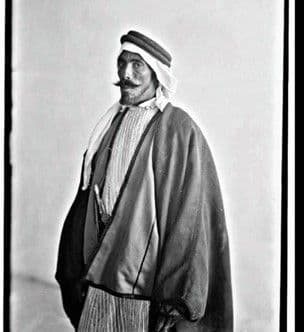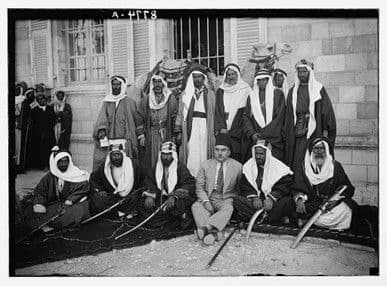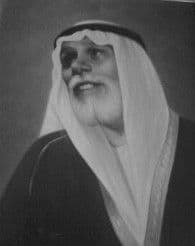Back to Archive
Witnesses
The witnesses in the Bseiso Family Archive were tribal leaders, businessmen, and community figures who played critical roles in early 1900s Beersheba. They were involved in politics, landownership, and local leadership, reflecting their influence on the region’s social and economic landscape. Together, they capture a dynamic period where tradition, commerce, and political change shaped Beersheba’s history.
Auda bin Jukhaydem

He is a witness to a number of contracts (including 0005, 0023). Auda was the Sheikh of Al-Mohammadeen Tribe from the Al-Azazmeh. He took this sheikhdom after his father. Outside sources show his name among prominent figures in Beersheba who were involved in Palestinian politics in the 1930’s along with Abdulrazzaq Abu Sitta (cf: Salman Abu Sitta). After 1948, he and his tribe relocated to Jordan where he lived in Amman.
Mohammad Shaker Hirzallah
A major businessman and landowner in Beersheba at the time. He is originally from Gaza. Sources indicate that he sold his property in Beersheba (including properties in documents 0037, 0043, 0053) before relocating to Gaza in the mid 1940’s. There is little information available about him after that, but his son Sa’adeddine and his descendants live in Amman, Jordan.
Suleiman Abu-Ghalyoun

He is mentioned as owning land bordering the property being sold in document 0027. Being a Sheikh of his tribe, his name is mentioned in outside sources as being involved in the politics of Palestine during the 1930’s. He is pictured here (fourth, standing) with Arif Al-Arif and other Sheikhs of the Beersheba area. He is also mentioned in this British court order in Jerusalem from 1939.
Mohammad Suleiman al-Nuairy
He is the seller in document 0022. He is the son of Sheikh Suleiman Al-Nuairy
Arif Ali Al-Najjar
He is mentioned in document 0047 as the co-owner of properties (with Jawdat Mahrous Bseiso (1924-2003), Mahrous’ son and right-hand man). Arif was a prominent businessman in Palestine in the 1940s. He was also involved in the political scene at the time. He published a newspaper (Al-Qarya Al-Arabiya “The Arab Town”) in Jerusalem in 1946. His son in law, Yahya Hammuda, rose to prominence and was for a short period of time the chairman of the PLO. Arif’s descendants live in Jordan. One of his daughters, Taghreed Al-Najjar, was a major fiction author.
Harb Abu Ruqayiq

He was the Sheikh of the Al-Qudairat tribe. Being the Sheikh, he had considerable influence in the area. Sources mention his name among the receiving party of Prince Abdullah in Gaza in 1934. He is also mentioned as the owner of purebred Arabian horses that participated in the Jaffa horse races between 1930-1935 (see picture). He was forced to relocate to Jordan after 1948; his descendants remain in Beersheba.
Auda Abu Al-Khayl
He is a witness mentioned in document 0005. He is the sheikh Al-Sawakhneh Al-Azazmeh. He assumed the Sheikhdom position in 1920 and passed away in the 1950’s. His descendants remain in the Beersheba area. Outside sources show his name among prominent figures in Beersheba who were involved in Palestinian politics in the 1930’s along with Abdulrazzaq Abu Sitta.
Salam Abu Mahfouz

He is mentioned as a witness in document 0037. He was a Sheikh of the Abu Mahfouz tribe (Al-Mahafzeh). He and his tribe were removed from their homes post 1948 from the village of Tell es-Seba (a.k.a Tell Abu Mahfouz).
Eissa Bseiso
He is the seller in document number 0039. He is the brother of Mahrous Bseiso. Sources indicate that he built one of the two main mosques in Beersheba in 1931 (the other having been built by the Ottomans). Eissa was the father of Dr. Saadi Bseiso (1902-2001), a renowned jurisprudent academic and politician in the Middle East.
- Bseiso Family Archive
- Archives
- Affiliates
- Stories
- News
- About
